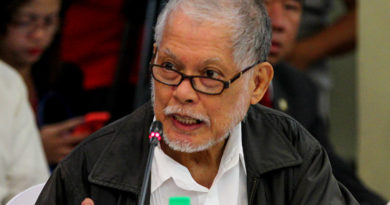OP ED COLUMN: OPINION ON PAGE ONE- Will DU30 bail out or dig in? – By Francisco S. Tatad
PRESIDENT Rodrigo Duterte’s admitted health problems and the alleged CPP/NPA/NDF plot to oust him compel him to either bail out or dig in. The health issue is far more serious than the ouster threat, and DU30 has said if he is diagnosed with cancer he would humbly step down. I very much doubt that. Once he’s out of office, he would be easy prey to the International Criminal Court at the Hague and other human rights organizations that are after him. They would find it easier to try him for crimes against humanity where before they could not. He will certainly not risk it.
For this reason, many of his supporters strongly believe DU30 would dig in, even if — or especially if — the doctors’ findings turn out to be far more worrisome than earlier feared. They believe DU30 may now have the actual results of his recent endoscopy and colonoscopy procedures, but has decided not to share them with the public. Although the Constitution says “in case of serious illness of the President, the public shall be informed of the state of his health,” there is no concrete way of compelling the President to divulge the details of his state of health
– SPACE RESERVE FOR YOUR ADVERTISEMENT –
.
Looking for ‘Dr. Poon’
Sources close to the President believe his current “holiday” with his partner and daughter in Hong Kong is part of his search for the cure to his yet undisclosed illness. Hong Kong is but a short train ride from Guangzhou where he had visited the famous Fuda Cancer Hospital a year ago; according to these sources, a trip to Fuda is a distinct possibility, although some of DU30’s Chinese friends have allegedly promised to put him in touch with a famous Chinese healer known only as “Dr. Poon.”
Meanwhile, some DU30 watchers see the rising level of violence and repression in various parts of the country as a clear sign that he has decided to dig in. While DU30 is trying to get out of the mess created by his recent statement that “my only sin is EJK (extrajudicial killing),” the current surge of killings in Cebu, for one, (16 dead in one day), seems to indicate the increasing use of violence for political control. The wave of violence in the “Queen City of the South” is particuarly significant because every day the Archdiocese of Cebu, under the leadership of Archbishop Jose Palma, is known to pray an “oratio imperata” (obligatory prayer) against extrajudicial killings.
– SPACE RESERVE FOR YOUR ADVERTISEMENT –
.
Downsizing, but digging in
Yet in the blink of an eye, the original plan was downsized without any explanation. Sara will now just run for mayor of Davao again, while her brother Paulo, whose name was once dragged into the P6.4 billion “shabu” scandal, will run for congressman. Another person of interest, who is reportedly intimately close to the President, is also allegedly running for the mayorship of Cagayan de Oro.
Analysts read all this as a sign that DU30 may have developed doubts about his ability to control the outcome of the senatorial elections while he confronts his health problems. He has therefore decided to scale down the area of his political engagement by bringing together his family in one bunker. Whether his final fight will be against “cancer” or against his former communist friends, this is where he will make his last stand.
This is how his closest supporters see him.
But there are those who seem to believe that DU30 does not have to be sick and threatened with an extra-constitutional plot in order to be confronted with the problem of political survival. In their view, all one has to do is to point out that DU30’s presidency — more than former Chief Justice Ma. Lourdes Sereno’s 2012 appointment to her position, or Sen. Antonio Trillanes 4th’s 2011 amnesty from then President B.S. Aquino 3rd — is null and void ab initio.
This is how they see it:
– SPACE RESERVE FOR YOUR ADVERTISEMENT –
.
An invalid candidacy
Former Davao city mayor Duterte filed his certificate of candidacy for president after the deadline for the filing of Certificate of Candidacy (CoCs). He did so as a substitute candidate for candidate Martin Diño who had withdrawn his candidacy. But Diño, as his signed electoral forms would attest, had filed his CoC not as a candidate for president but as a candidate for mayor of Pasay City. He could be validly replaced by a candidate for mayor of Pasay city, not by a candidate for the presidency. That’s the long and short of it.
Broadcaster Ruben Castor, University of the Philippines Student Council president John Paulo de las Nievas, and disqualified presidential candidates Elly Pamatong and Rizalito David sought to disqualify DU30 because of the invalid substitution. Their petitions were consolidated into one and dismissed by the First Division of the Commission on Elections, which ruled that Diño’s alleged intention to run for president prevailed over the fact that his CoC was meant for the mayorship of Pasay City.
As all lawyers will argue, and all judges and courts will declare, “the document speaks for itself.” And Diño’s document said he was running for mayor of Pasay City. At best, it contained a basic contradiction — the form was meant for a mayoralty candidate, but the applicant said he was running for president. This made the CoC defective on its face. If Diño did not drop out, he might have been dismissed as a crank and disqualified from running anyway. But because he did, the defective form became valid as soon as DU30 took his place.
Three years too late?
I found the argument compelling, but I wondered if they were not fighting their war three years too late? Not at all, one of them said. He pointed out that DU30 set the precedent, an abominable one, when eight of the 15 justices of the Supreme Court, upon his behest, declared Chief Justice Maria Lourdes Sereno’s 2012 appointment to the top judicial post null and void ab initio; and when DU30 himself declared a 2010 proclamation by then President B.S. Aquino 3rd, granting amnesty to former Navy lieutenant and now Sen. Antonio Trillanes 4th for his participation in the 2003 Oakwood mutiny and the 2007 Manila Peninsula siege, null and void ab initio.
These “precedents” wreaked havoc on the Constitution and the rule of law, said one of them, who teaches law. Under the Rules of Evidence, he said, a court shall take judicial notice, without introduction of evidence, of the existence and territorial extent of states, their political history, forms of government and symbols of nationality, the law of nations, the admiralty and maritime courts of the world and their seals, the political constitution and the history of the Philippines, the official acts of the legislative, executive and judicial departments of the Philippines, the law of nature, the measure of time and the geographical divisions.
How then can the President, by mere proclamation, declare null and void ab initio—i.e. having no legal force and effect from the beginning—a previous President’s amnesty proclamation, which has been concurred in by Congress, and taken cognizance of by the judiciary when the Regional Trial Courts dismissed the cases filed against those who had been granted amnesty?
This abomination must be revisited when constitutional normalcy returns to the country. Meanwhile, given these abominable precedents, the court should have no problem declaring an invalid candidacy null and void ab initio. It should be able to do this even if it was the Comelec en banc, not just its first division, that dismissed the pre-election petitions to disqualify DU30, my interlocutor said.
If the majority of the Supreme Court could declare, without a word from the Constitution, the six-year-old appointment of their Chief Justice null and void ab initio, and if DU30 himself could declare, also without a word from the Constitution, the eight-year-old proclamation of a former president null and void ab initio, how much more can the same court not declare DU30’s candidacy, based on the clearly erroneous decision of three Comelec commissioners, null and void ab initio?
The logic seemed irreproachable, but it seemed like wishful thinking, given DU30’s virtual control of the whole distillery. But even if no court should ever declare DU30’s presidency null and void ab initio, my interlocutor said the Filipino people must know what they have a right to know. My only worry is that after they shall have counted out DU30’s presidency as null and void ab initio, will they be able to stand it when they are told that their “rightful president” could be the fellow who polled 23.4 percent of the votes to DU30’s 38.6 percent, Mar Roxas of the Liberal Party?
 All photographs, news, editorials, opinions, information, data, others have been taken from the Internet ..aseanews.net | [email protected] |.For comments, Email to :D’Equalizer | [email protected] | Contributor
All photographs, news, editorials, opinions, information, data, others have been taken from the Internet ..aseanews.net | [email protected] |.For comments, Email to :D’Equalizer | [email protected] | Contributor









